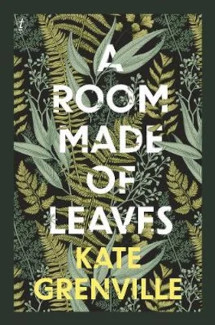A room made of leaves by Kate Grenville

Text Publishing, 2020. ISBN: 9781922330024.
(Age: Senior secondary) Highly recommended. 'Our nation rides on the
sheep's back' and John Macarthur was supposedly the 'father of the
wool industry' but, as Kate Grenville points out, the merino sheep
were largely developed whilst Macarthur was actually in England for
two lengthy periods being prosecuted for crimes in Australia.
Grenville suggests that perhaps the Father of the Wool Industry was
actually the Mother of the Wool Industry, his wife, Elizabeth
Macarthur, a figure lost to history. What remains in the historical
record, the letters of Elizabeth, reveal very little, but a closer
more clever examination of her written words, could present an
entirely different picture of the life of the Macarthurs. It is this
idea that Grenville pursues. She imagines the life of the forgotten
Elizabeth, as another example of the neglected contribution of so
many pioneer women; for history only tells us of the exploits of the
men. Grenville imagines the discovery of a memoir, and shares it
with us, as an alternative picture from a woman's point of view.
Grenville's novel examines the limited prospects for women, denied
education and dependent on marriage for security. Elizabeth fails to
heed the warnings to 'keep herself safe' and her moment of
wilfulness leads to a necessary marriage to the taciturn Captain
Macarthur. Then it becomes the problem of how to manage his moods,
and make some kind of life together in New South Wales.
A strong theme throughout the novel is the idea of false stories:
from the need for women to protect their reputation, to the
colonialists' versions of the conflict with the Aboriginal people,
to the innuendos about the astronomer William Dawes' relationship
with young Patyegarang. It just depends on who is telling the story.
Life in the colony managing a sheep farm, alone for long periods
without her husband, could be imagined as one of hardship and
loneliness. However for Elizabeth, thrown on her own resources, it
actually becomes an opportunity to discover her true self.
Grenville's book is well researched and she even makes use of
Elizabeth's own words from her letters to suggest a hidden
alternative interpretation of her life. It is historical fiction but
perhaps creates a more true understanding of the past.
Themes: Women, New South Wales colony, Aboriginal people, Conflict,
False stories.
Helen Eddy